OSU Faculty Spearheads First U.S.-Led Conference in Cuba
Tuesday, February 23, 2016
|
Denni Blum, an educational anthropologist and associate professor in Social Foundations in the College of Education at Oklahoma State University, made history in 2015 when she secured the first grant possible for an academic exchange initiated by the United States in Cuba and organized a workshop attended by anthropologists and scholars nine countries in Havana. Blum has conducted research in Cuba for 20 years, is the only scholar of Cuba to have acquired long term access to Cuban schools, and is the author of,Cuban Youth and Revolutionary Values: Educating the New Socialist Citizen. While on sabbatical in the fall of 2014, Blum was invited to conduct research at the Juan Marinello Cuban Institute of Cultural Research in Havana. She received permission and invited colleagues at the Institute to collaborate with her in applying for a workshop grant, despite that fact that policy did not allow for a conference sponsored by a United States citizen to be held in Cuba. Anthropology had been eliminated as a discipline at the University of Havana in 1959 when Fidel Castro took over. Only recently, in 2008, have two cohorts been permitted to pursue master’s degrees in anthropology.
That possibility was not enough to deter Blum. “As I had watched changes happen in Cuban schools (in 2011), changes which reflected
economic and political apertures, I began to think that the country was going to open
up,” Blum says. Blum worked with colleagues Rodrigo Espina Prieto and Rosalin Bayona Mojena from the
Juan Marinello Cuban Institute of Cultural Research to organize the conference. Blum
attempted to connect via phone with Prieto and Mojena on many occasions, but communication
was unreliable as neither side could ever be heard very well. All of the planning
was done electronically. From December 1-3, 2015, 22 presenters and a by-invitation only Cuban audience of 40, gathered at the Hotel Habana Riviera. Blum says the workshop was designed to nourish self-made cultural anthropologists and support them in the anthropological pursuits. Conducted in Spanish, the workshop focused on recent debates in anthropology, particularly on social justice. Panels covered race relations, violence, the transformative role of education, whether and how anthropologists can be active in academe and applied practices. The library at the Juan Marinello Institute received anthropological scholarly donations
in the field, including books and articles uploaded on flash drives. Materials were
widely distributed to both the presenters and Cuban audience members. “The group quickly became cohesive and collegial with each other and the Cubans. It
was a wonderful group, not only as scholars but as people,” Blum says. “This workshop was highly successful; the participants asked when would be the follow
up to the workshop.” Wenner-Gren was impressed with how much Blum and her colleagues were able to accomplish during the conference, and the foundation stepped up to provide funds to print 1,000 copies of the book. |

 “I went with my intuition and decided to put in a proposal and see what happened.
I thought, ‘What’s the worst thing that could happen? They could say no?’.”
“I went with my intuition and decided to put in a proposal and see what happened.
I thought, ‘What’s the worst thing that could happen? They could say no?’.”